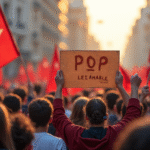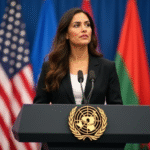Background on Key Players and Relevance
Several prominent non-governmental organizations (NGOs) in Mexico have joined forces to challenge the integrity of recent election results. These organizations include Poder Ciudadano, Consejo Nacional de Litigio Estratégico, PROJUC, Defensorxs, Práctica Laboratorio para la Democracia, and Laboratorio Electoral. Their collective effort aims to support candidates who participated in the extraordinary election held on June 1 and electoral experts in filing a complaint against the validity of results issued by the National Electoral Institute (INE).
Among these NGOs, Galileo is another key player led by José Guadalupe Acosta Naranjo. Galileo, along with the other organizations, will be presenting their case to the Federal Electoral Tribunal of the Power Judicial Council (TEPJF) to seek the nullification of these elections, which they claim lack integrity.
Key Events and Arguments
- Allegations of Irregularities: Acosta Naranjo highlighted that nine out of ten Mexicans rejected the election due to threats, “acordeones” (guided voting instructions), and vote buying.
- INE’s Response: INE consejera presidenta Guadalupe Taddei acknowledged irregularities but emphasized that they were identified, exposed, and addressed accordingly. INE proactively recognized and excluded around 800-900 polling stations (less than 1% of the total 84,000) due to serious irregularities.
- Consejeros’ Concerns: Some consejeros raised doubts about election integrity, pointing to the widespread use of “acordeones” and signs of vote-buying and coercion.
- TEPJF’s Role: The Federal Electoral Tribunal will now determine if the election process was compromised and if isolated errors or bad practices significantly affected citizens’ voting intentions.
Key Questions and Answers
- Question: What is the main issue these NGOs are addressing?
- Question: How did the INE respond to the alleged irregularities?
- Question: What concerns did some consejeros express regarding the election process?
- Question: What is the role of the TEPJF in this situation?
Answer: The NGOs aim to challenge the integrity of recent election results, alleging irregularities such as threats, guided voting instructions (“acordeones”), and vote-buying.
Answer: INE consejera presidenta Guadalupe Taddei acknowledged the irregularities, identified them publicly, and took action by excluding affected polling stations from the national count.
Answer: Some consejeros raised doubts about election integrity, citing the prevalence of “acordeones” and signs of vote-buying and coercion.
Answer: The Federal Electoral Tribunal will evaluate whether the election process was compromised and if isolated errors or bad practices significantly affected citizens’ voting intentions.
Context and Impact
The recent extraordinary election in Mexico has sparked controversy and raised concerns about electoral integrity. NGOs like Poder Ciudadano, Consejo Nacional de Litigio Estratégico, PROJUC, Defensorxs, Práctica Laboratorio para la Democracia, and Laboratorio Electoral have joined forces with Galileo to challenge the election results. These organizations argue that the election lacked integrity due to various irregularities, including threats, guided voting instructions (“acordeones”), and signs of vote-buying and coercion.
The National Electoral Institute (INE) acknowledged the irregularities but emphasized that they were identified, exposed, and addressed accordingly. INE proactively recognized and excluded around 800-900 polling stations (less than 1% of the total 84,000) due to serious irregularities. However, some consejeros within the INE raised doubts about election integrity, pointing to the widespread use of “acordeones” and signs of vote-buying and coercion.
The Federal Electoral Tribunal of the Power Judicial Council (TEPJF) now faces the task of determining if the election process was compromised and if isolated errors or bad practices significantly affected citizens’ voting intentions. This case highlights the importance of electoral integrity and the role of civil society in ensuring fair and transparent elections.






